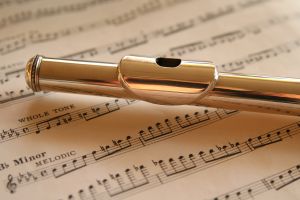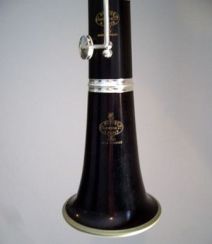Music for Kids
How Woodwind Instruments Work
Woodwind instruments have two major components in making music. The first is blowing air and the second is making notes by covering holes in the tube.
Blowing Air
By blowing air into or across the mouthpiece, the musician creates vibrations that make sounds and notes. There are two main ways that the vibrations are made in woodwind instruments.
Flute
The flute family of instruments creates sounds when air is blown across an edge. The air gets split by the edge causing vibrations, like when you blow across the edge of a bottle. The edge may be at the mouthpiece or further inside the mouthpiece.
 The mouthpiece of a flute
The mouthpiece of a flute
Reed
In reed instruments the sounds or vibrations are made when the air travels across a thin piece of wood called a reed. The reed vibrates making the sound. Some instruments have one reed, like the clarinet and the saxophone. Other instruments use two reeds to vibrate against each other, like the oboe and the bassoon.
Playing Notes
Notes are made in woodwinds by covering holes on the long tubes. This changes the length that the air must travel when vibrating, also causing the note that is played to change. On some instruments, like the recorder, the holes are covered with your fingers. By changing which holes are covered and which are open, the notes change. Other more advanced woodwinds, like the saxophone and oboe, have metal keys that are pressed. When a key is pressed by the musician, a soft pad is raised from a hole allowing air to flow through. The keys make it easier to play a long instrument with a lot of holes.
 The keys of a woodwind
The keys of a woodwind
The longer the tube or column of air the lower pitch the note will be. This means that to get the lowest note out of a woodwind you should cover all the holes. For the highest pitch, just leave the closest hole to the mouthpiece open.
Size and Shape
Although their shape can vary slightly, most woodwinds are long cylinders or tubes with a mouthpiece for blowing air at one end with holes along the length of the tube. The size of the woodwind determines its pitch. Smaller woodwinds like piccolos and flutes make high pitched notes, while large woodwinds like the bassoon make low notes.
The Bell
The end of the instrument is called the bell. Sometimes the bell is curved shaped like on the clarinet and the saxophone and other times it is straight like on the flute. The bell helps to make low notes and the shape needed differs depending on the type of instrument.
 The bell of a clarinet
The bell of a clarinet
More on Woodwind Instruments:
Other musical instruments:
Back to Kids Music Home
Page

